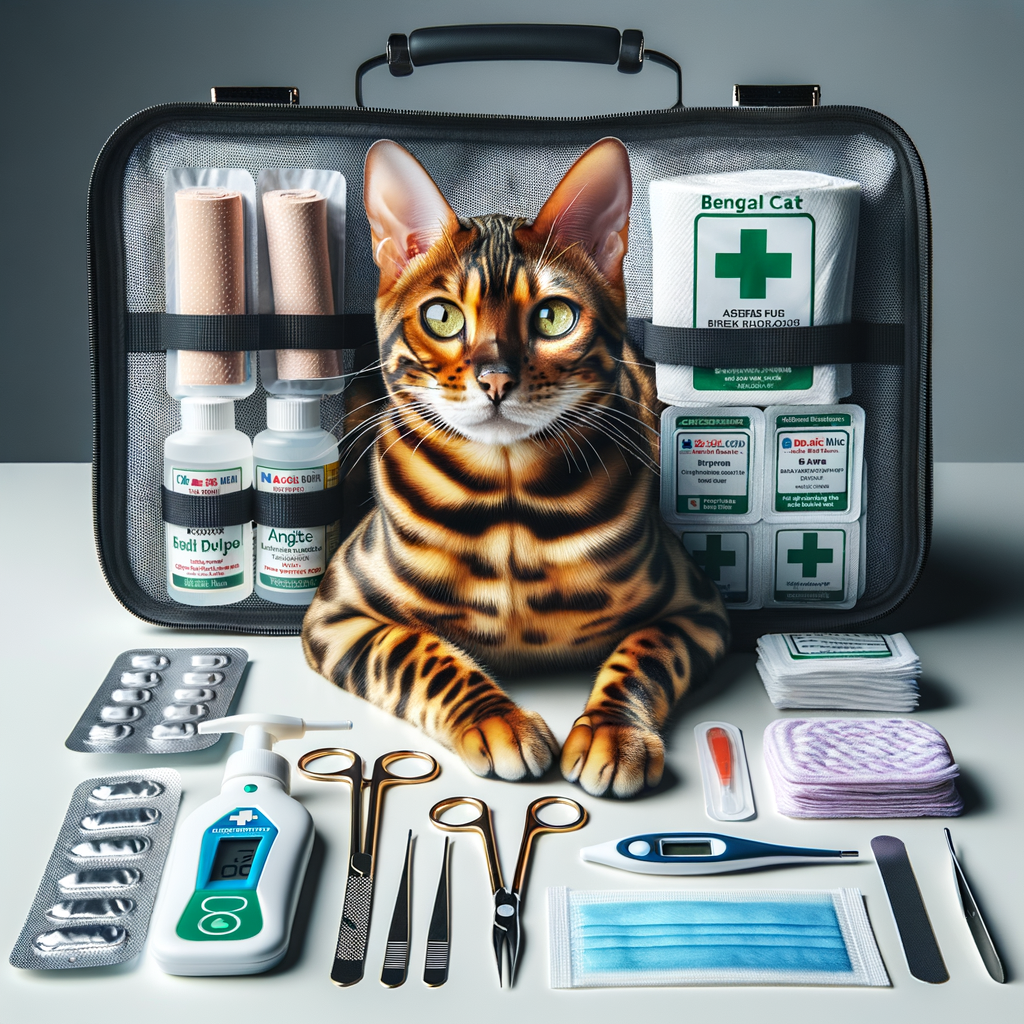
Introduction to Bengal Cat First Aid Essentials
Just like humans, Bengal cats can have accidents or sudden health issues. Having an emergency kit ready can save precious time and help you provide immediate care. This can make a big difference in your cat’s recovery.
- Understanding Bengal cat health supplies:
Knowing what supplies are essential for your Bengal cat’s health is crucial. Items like bandages, antiseptic wipes, and a digital thermometer can help you handle minor injuries or illnesses at home. It’s also important to have your vet’s contact information handy for emergencies.
Building Your Bengal Cat Safety Kit
Essential Items for Your Bengal Cat Medical Kit
- Bandages and gauze: These are crucial for treating minor cuts and wounds. Make sure to have a variety of sizes to fit different injuries.
- Antiseptic wipes: Use these to clean wounds and prevent infections. They are easy to use and very effective.
- Tick and flea treatment: Keeping your Bengal cat free from ticks and fleas is essential for their health. Regular treatments can prevent many issues.
- Eye and ear cleaning solutions: These solutions help keep your cat’s eyes and ears clean and free from infections. Use them as directed by your vet.
- Thermometer: A pet thermometer is important to check your cat’s temperature if they seem unwell. Knowing their normal temperature can help you spot problems early.
Optional Items for Your Bengal Cat Medical Kit
- Blanket: A soft blanket can provide comfort and warmth to your Bengal cat during stressful situations. It can also be used to wrap your cat if you need to keep them still for treatment.
- Extra food and water: Always have extra food and water in your kit. This is especially important if you need to travel or if there’s an emergency that keeps you away from home longer than expected.
- Travel carrier: A sturdy travel carrier is essential for safely transporting your Bengal cat to the vet or in case of evacuation. Make sure it’s comfortable and well-ventilated.
First Aid for Bengal Cats: Common Scenarios
Bengal Cat Injury Treatment
- How to handle minor injuries:
Minor injuries like small cuts or scrapes can happen to your Bengal cat. First, clean the wound with warm water and mild soap. Then, apply an antiseptic solution. Make sure to keep your cat calm and avoid letting them lick the wound. You can use a clean cloth to gently press on the area to stop any bleeding.
- When to seek professional help:
If the injury is deep, bleeding heavily, or if your cat is in a lot of pain, it’s best to see a vet. Also, if the wound doesn’t heal in a few days or shows signs of infection like redness, swelling, or pus, take your Bengal cat to the vet immediately.
Bengal Cat Health Emergency
- Recognizing signs of a health emergency
It’s crucial to know when your Bengal cat is in trouble. Here are some signs to watch for:
-
- Difficulty Breathing: If your cat is panting or gasping, it needs help right away.
- Severe Bleeding: Any uncontrolled bleeding is a serious issue.
- Unresponsiveness: If your cat is not responding to your voice or touch, it’s an emergency.
- Seizures: Shaking or convulsing is a sign of a serious problem.
- Swollen Abdomen: A bloated belly can indicate a severe condition.
- Steps to take in an emergency
When your Bengal cat is in an emergency, follow these steps:
-
- Stay Calm: Your cat needs you to be calm and collected.
- Contact a Vet: Call your vet or an emergency animal clinic immediately.
- Provide Basic First Aid: If your cat is bleeding, apply pressure to the wound with a clean cloth.
- Keep Your Cat Warm: Wrap your cat in a blanket to keep it warm while you seek help.
- Transport Safely: Use a carrier to transport your cat to the vet to avoid further injury.
Bengal Cat Home Care Tips
-
Maintaining a Safe Environment
Creating a safe home for your Bengal cat is crucial. Ensure that all small objects, toxic plants, and chemicals are out of reach. Bengals are curious and love to explore, so it’s important to cat-proof your home. Consider using child-proof locks on cabinets and securing loose wires.
-
Regular Check-ups and Vaccinations
Regular vet visits are essential for keeping your Bengal cat healthy. Schedule annual check-ups and stay up-to-date with vaccinations. These visits help catch any health issues early. According to veterinary medicine, early detection can make a big difference in treatment success.
-
Proper Nutrition and Exercise
Bengal cats need a balanced diet and plenty of exercise. Feed them high-quality cat food and provide fresh water daily. Bengals are active and playful, so engage them with toys and activities. Regular playtime helps keep them fit and mentally stimulated.
Conclusion: Ensuring Your Bengal Cat’s Health and Safety
Taking care of a Bengal cat involves more than just feeding and playing. Their health and safety are paramount. Here are some key points to remember:
- Importance of regular vet visits:
Regular check-ups with the vet help catch any health issues early. This can prevent serious problems and keep your Bengal cat healthy. According to the American Veterinary Medical Association, cats should visit the vet at least once a year for a routine check-up.
- Benefits of having a Bengal cat first aid kit:
A first aid kit can be a lifesaver in emergencies. It should include items like bandages, antiseptic wipes, and tweezers. Having these supplies on hand ensures you can quickly address minor injuries or issues before getting to the vet.
By following these tips, you can ensure your Bengal cat stays healthy and safe. Regular vet visits and a well-stocked first aid kit are essential parts of responsible pet ownership.
| Key Point | Details |
|---|---|
| Regular Vet Visits | Helps catch health issues early and keeps your cat healthy. |
| First Aid Kit | Essential for addressing minor injuries and emergencies. |
Remember, a healthy Bengal cat is a happy Bengal cat. Taking these steps will ensure your feline friend lives a long, joyful life.






